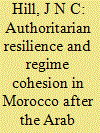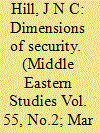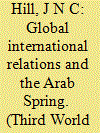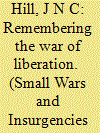| Srl | Item |
| 1 |
ID:
163763


|
|
|
|
|
| Summary/Abstract |
This article argues that Morocco's competitive authoritarian regime is more resilient today in certain key respects than it was when the Arab Spring began. Drawing on Levitsky and Way's dimension of organisational power, the article contends the regime was sufficiently unnerved by the unrest to resort to the use of high intensity coercion as part of its response to the 20 February Movement. The article maintains that, in employing this force successfully, the regime has turned the protests into an important source of non-material cohesion for its security apparatus and thereby enhanced its ability to defend itself from similar challenges in the future.
|
|
|
|
|
|
|
|
|
|
|
|
|
|
|
|
| 2 |
ID:
163757


|
|
|
|
|
| Summary/Abstract |
The Arab uprisings’ failure to bring about either the scale or type of political change in the Maghreb that it initially seemed to promise belies the significance of its impact on the region. While Algeria, Mauritania and Morocco continue to be ruled by the same competitive authoritarian regimes that held power when the protests began, they, and the new governments in Tunisia and Libya, must now negotiate an altered and more dangerous security environment than before. The unsettling of Tunisia’s security apparatus and the outbreak of full-blown civil war in Libya have created new opportunities for terror and criminal groups to thrive and expand. The primary aim of this special issue is to chart and explain many of the critical changes in the Maghreb’s security environment that have occurred as a result of the Arab Spring. Each of the articles collected here identifies and analyses at least one important security issue in one or more Maghreb country as well as explain how that issue has emerged in response to or been affected by the Arab Spring.
|
|
|
|
|
|
|
|
|
|
|
|
|
|
|
|
| 3 |
ID:
163080


|
|
|
|
|
| Summary/Abstract |
This article contributes to the Global International Relations project by critically evaluating the roles ascribed to Europe and the EU by Levitsky and Way in their model for explaining regime transitions. Focusing primarily on their international dimensions of linkage and leverage, it assesses both the normative geopolitical underpinnings and explanatory power of their thesis, drawing on the North African cases of Tunisia and Mauritania at the start of the Arab Spring to illustrate and substantiate its observations and arguments. It concludes that the EU’s failure to discipline either country’s competitive authoritarian regime raises important questions about the validity of the privileged role in which they cast Europe.
|
|
|
|
|
|
|
|
|
|
|
|
|
|
|
|
| 4 |
ID:
109951


|
|
|
|
|
| Publication |
2012.
|
| Summary/Abstract |
The aim of this article is to consider how Algeria's most prized achievement and treasured memory - the FLN's victory over the French in the war of liberation - has helped stimulate and sustain the violence that has blighted the country since independence. It argues that successive governments have propagated a legend of the war that encourages and legitimises rebellion and armed resistance. By celebrating the actions and achievements of a committed band of revolutionaries they have established a precedent whereby it is every citizen's duty to oppose and resist an unjust government. Time and again therefore, insurgent groups like the FFS, MIA, and AIS have justified their actions and won popular support by portraying themselves as the early FLN's natural heir.
|
|
|
|
|
|
|
|
|
|
|
|
|
|
|
|